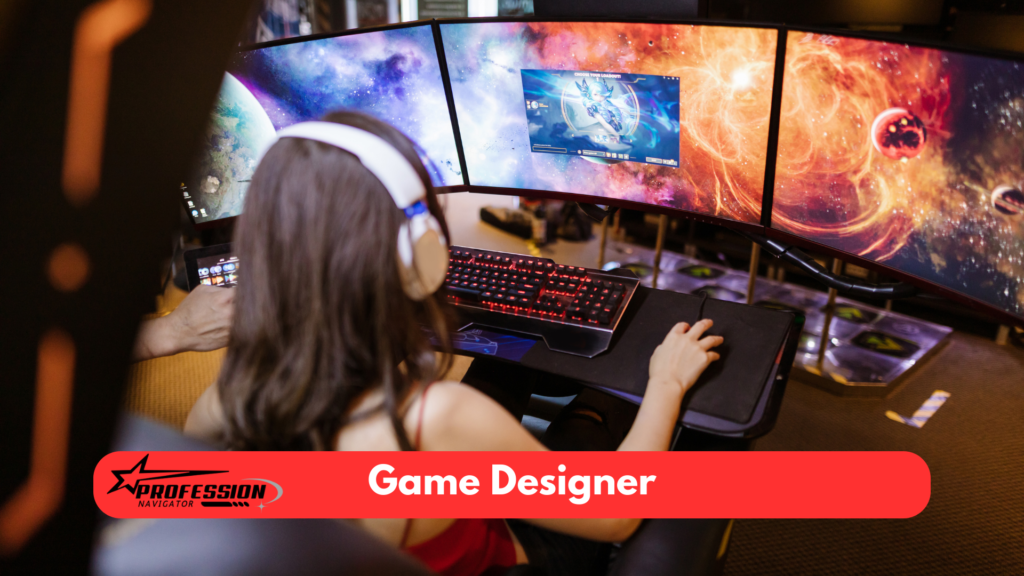Become a Game Designer: Welcome to Profession Navigator, Are you passionate about video games and dream of designing them? If so, you’re in the right place. The world of game design is not only exciting but is expanding rapidly, making 2024 an excellent time to embark on this career path. This article will walk you through how to become a game designer, covering everything from educational requirements to salary expectations, and even the challenges you may face.
Table of Contents
What is a Game Designer?
What Do Game Designers Do?
A game designer is the creative force behind video games, crafting the game’s mechanics, storylines, and player experiences. They turn a concept into a fully immersive world, designing everything from character abilities to level structures. If you’ve ever been captivated by a video game, a designer meticulously planned each aspect of that experience.
Key Skills for Game Designers
Game designers must possess a blend of creative and technical skills. Key competencies include problem-solving, storytelling, user experience design, and proficiency in game design software like Unity or Unreal Engine. In addition to this, strong communication and collaboration skills are critical, as designers often work in teams.
Read also: How to find Game Designer jobs in the UK
Why Choose a Career in Game Design?
The Growing Demand for Game Designers
With the gaming industry generating billions of dollars annually, the demand for skilled game designers is higher than ever. From mobile apps to large-scale AAA titles, companies are continuously searching for innovative minds to push the boundaries of what games can be.
Creativity Meets Technology
Game design is one of those rare careers that allows you to fuse creativity with cutting-edge technology. You’re not just coming up with ideas; you’re using tools and coding to bring those ideas to life, creating experiences that captivate players worldwide.
Educational Requirements to Become a Game Designer
Bachelor’s Degree in Game Design
Most game designers start by pursuing a Bachelor’s Degree in Game Design, Computer Science, or a related field. Programs typically cover key areas such as 3D modeling, animation, and coding languages (C++, JavaScript). These degrees offer a strong foundation for breaking into the industry.
Alternative Educational Pathways
Not all game designers follow the traditional college route. Many successful designers have entered the industry through boot camps, online courses, or even self-study. Platforms like Coursera and Udemy offer specialized courses that teach essential game design skills.
Top Certifications for Aspiring Game Designers
Unity Certified Expert: Game Designer
The Unity Certified Expert program is one of the most respected certifications in the industry. Unity is a widely used game engine, and this certification proves your expertise in using it to create high-quality games.
Adobe Certified Professional
For those specializing in character design and concept art, the Adobe Certified Professional (ACP) program is valuable. This certification demonstrates proficiency in using Adobe’s suite of creative software, such as Photoshop and Illustrator.
Work Experience: Gaining Practical Knowledge
Internships in Game Design
Internships are a fantastic way to get hands-on experience in the industry. Many gaming companies offer internships where you’ll work directly with professional designers, gaining insight into the development process.
Entry-Level Positions to Look Out For
Starting as a junior game designer, QA tester, or level designer are common entry-level role. These positions provide invaluable experience and can serve as stepping stones to more senior roles.
How to Build a Strong Portfolio as a Game Designer
Highlighting Projects and Prototypes
Your portfolio is your gateway to landing a job in game design. Showcase any games you’ve worked on, whether they are school projects, personal prototypes, or collaborative efforts. Focus on displaying your creativity, technical skills, and problem-solving abilities.
Showcasing Your Creativity and Problem-Solving Skills
When building your portfolio, emphasize the unique aspects of your work. Did you come up with an innovative game mechanic? Was there a particular challenge you overcame in development? Highlighting these will make you stand out.
Networking in the Gaming Industry
Joining Game Design Communities
Networking is crucial in the gaming industry. Joining online communities like Reddit’s game dev forums or participating in Game Jams are great ways to meet other designers, exchange ideas, and even collaborate on projects.
Attending Game Developer Conferences
Events like the Game Developers Conference (GDC) are excellent for networking. You’ll have the chance to meet industry veterans, attend workshops, and learn about the latest trends in game development.
Tools and Software Used by Game Designers
Industry-standard software (Unity, Unreal Engine, etc.)
Unity and Unreal Engine are the two most widely used tools in game design. Unity is known for its flexibility, while Unreal Engine offers top-notch graphics rendering. Familiarizing yourself with these platforms is crucial for success in game design.
Best Tools for Concept Art and Prototyping
For concept art and storyboarding, tools like Adobe Photoshop, Illustrator, and Blender are essential. These allow you to create detailed visual elements before turning them into interactive gameplay.
Soft Skills Every Game Designer Should Have
Teamwork and Communication
Game design is highly collaborative. Being able to work well with others, whether they are programmers, artists, or writers, is critical to the success of a project.
Time Management and Adaptability
Game development often comes with tight deadlines. As a designer, you must be able to prioritize tasks, manage time effectively, and adapt to changing project requirements.
Top Game Design Companies to Work For
Electronic Arts (EA)
EA is one of the largest gaming companies in the world, known for titles like FIFA, Madden NFL, and The Sims. They offer excellent opportunities for game designers to work on globally recognized franchises.
Ubisoft
Ubisoft is another industry giant, famous for games like Assassin’s Creed and Far Cry. They are known for their innovative game design approaches and offer a stimulating work environment.
Blizzard Entertainment
Blizzard is renowned for creating games that have a lasting impact, such as World of Warcraft and Overwatch. Many game designers dream of Working at Blizzard due to the company’s reputation for quality and creativity.
Salary and Pay Scale for Game Designers
Entry-Level Game Designer Salary
An entry-level game designer can expect to earn between $50,000 to $70,000 annually, depending on the company and location.
Senior-Level Pay Scale and Opportunities
Senior game designers with extensive experience can earn over $100,000 per year. As you climb the ladder, opportunities to become a lead designer or creative director open up, along with higher salaries.
The Future of Game Design in 2024 and Beyond
Innovations in AR/VR
The future of game design lies in emerging technologies like Augmented Reality (AR) and Virtual Reality (VR). These platforms offer new ways for designers to create immersive experiences that go beyond traditional gaming.
The Rise of Indie Games
Indie games are becoming more popular, with platforms like Steam providing a space for independent creators to thrive. Many aspiring designers are turning to indie development as a way to break into the industry.
Challenges in the Game Design Career
Keeping Up with Rapid Technological Changes
Technology in gaming evolves quickly, and designers must continually learn new tools, software, and trends to stay competitive.
Balancing Creativity and Client Requirements
Sometimes, what you want to create as a designer may not align with the client’s vision. Learning to balance creative freedom with meeting client expectations is a crucial skill.
Conclusion
Becoming a game designer in 2024 is both challenging and rewarding. Whether you’re drawn to storytelling, technical design, or the latest in AR/VR technology, this career allows you to bring your passion for games to life. By gaining the right education, certifications, and experience, you’ll be well on your way to success in this dynamic field.
Frequently Asked Questions (FAQs)
- What is the average time it takes to become a game designer?
- On average, it takes around 4-6 years, including education and gaining practical experience.
- Do I need a degree to become a game designer?
- While a degree is helpful, many designers enter the industry through alternative education, such as boot camps or self-study.
- What software do I need to learn to become a game designer?
- Unity, Unreal Engine, Blender, and Adobe Creative Suite are the most common tools.
- Can I work as a freelance game designer?
- Yes, many game designers work as freelancers, especially in the indie game development space.
- Is game design a good career for the future?
- Absolutely! The gaming industry is expanding rapidly, with emerging technologies like VR and AR creating new opportunities.


